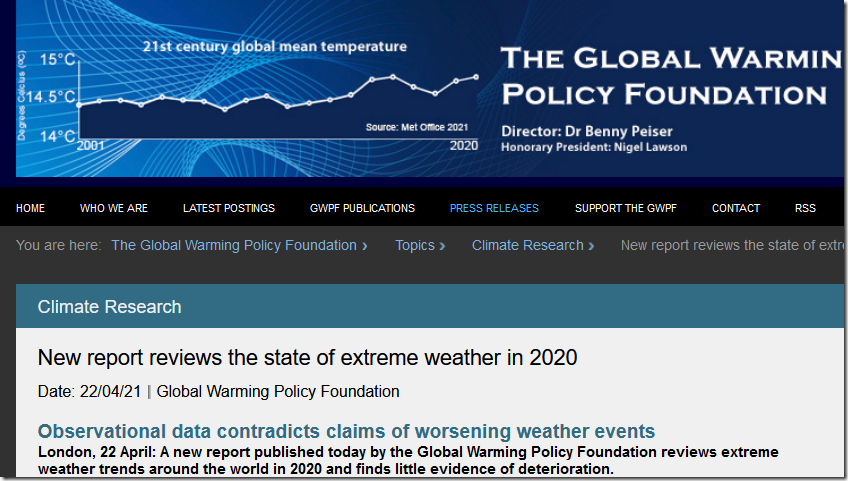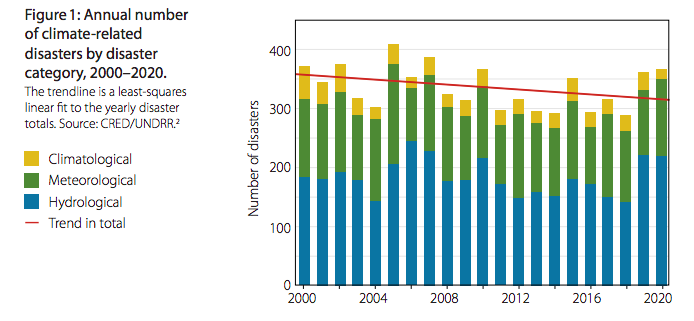New report reviews the state of extreme weather in 2020
By Paul Homewood
The report, by physicist Dr Ralph Alexander, also looks at how extreme weather has been reported by others and finds much more to be concerned about.
For example, Dr Alexander says that 2020 saw a number of socio-economic studies that attempted to link extreme weather to global warming. But the conclusions of these papers were contradicted by their own data, which showed a reduction in climate-related disasters, and in the number of people killed by them.
Dr Alexander concludes by noting that 2020, just like any other year, saw a series of weather extremes. These included a heatwave in Siberia, a cold summer in the Northern Hemisphere, an active hurricane season in the North Atlantic, and wildfires in the US and the Arctic. But he observes that there is little evidence of any long-term worsening of these events, and indeed that most can be linked to natural climatic cycles.
Dr Alexander said:
“It doesn’t matter what extreme weather phenomenon you look at, evidence of long-term worsening is sketchy at best and in many cases non-existent.”
Dr Benny Peiser, GWPF director said:
“Ralph Alexander’s data-driven report gives valuable perspective on the common media narrative of climate doom. Scares sell, but the interested public needs the full context of observational data and long-term trends to make informed judgements.”
Full report: Extreme Weather in 2020 (pdf)
Comments are closed.


Dear Paul – in the Times today:
You are not alone!
Britain needs to go green but
not at any price
As we race to set expensive carbon targets a distinguished physicist
points out that climate science is far from settled
Iain Martin, Thursday April 22 2021, The Times
In 2014, the distinguished scientist Steven Koonin assembled 11 of his colleagues. This group of
experts wanted to stress-test the science that was being used to make big claims by governments
and the UN about warming of the Earth and the need for radical action.
Where was the data poor, they asked, or the assumptions weakly supported? How reliable were the
models likely to be in describing the past and in making projections about the future? They
concluded that the deficiencies in climate data made it difficult to untangle human influences and
poorly understood natural changes. The science, they concluded, was often insufficient to make
useful projections.
The computer models on climate change conflict with each other, a messy reality that is perhaps
too nuanced for widespread public consumption when leaders want a simple message to sell.
Governments and the UN regularly produce press releases that do not accurately reflect the
reports, Koonin says. On this basis, potentially questionable policy is made. This is the starting point
for Koonin’s essential new book, Unsettled: What Climate Science Tells Us, What it Doesn’t and
Why it Matters, out next month.
Koonin is not a denialist. He worked in the US energy department for the Obama administration and
before that was employed at BP in renewable energy when the oil behemoth was in its “Beyond
Petroleum” phase. Attached to the California Institute of Technology for three decades, he served
for a time as its provost.
This is a physicist and a pragmatist who says: “The globe is warming and humans are exerting a
warming influence upon it.” But as he explains, climate science is relatively new, highly complex and
deeply contested.
Picking apart some of the distorted claims that have characterised much of the debate on this
subject, Koonin demolishes the assertions made by the World Health Organisation (WHO) that
climate change is already killing us. Weather-related deaths fell dramatically in the last century as
the Earth warmed: “They’re about 80 times less frequent today than they were a century ago.”
Claims that warming threatens the world’s food supply are misleading, too, he says. Production has
soared. Numerous other factors — trade patterns, technology, disease, conflict, taste and the
human capacity for adaptation and innovation — shape food production.
“Creating alarming headlines through highly uncertain projections of the future is one thing,” he
writes, “but promoting the spectre of climate-related deaths by distorting existing data is quite
another.”
Towards the end of Unsettled I realised why reading Koonin’s book is, as he intends, so unsettling.
All of the mainstream political parties in the West agree there must be the most extraordinary
overhaul of industry, financial and energy policy to decarbonise the economy in the next two
decades.
Page 1 of 2
This week, President Biden will announce dramatic new targets when 40 world leaders meet,
virtually, at his two-day climate summit. In preparation, Boris Johnson announced that the British
government will put the world’s most ambitious climate change target into law. The promise is to
reduce emissions by 78 per cent by 2035 compared with 1990 levels. None of the leaders involved
will be in office when the bill for this lands, which is lucky for them, as it is likely to be enormous.
Estimates of the cost to Britain range from the Treasury’s reading of the numbers, about £1 trillion, to
claims by sceptical campaigners of a figure closer to £3 trillion.
Life and public policy being what it is, rising energy bills and consumer costs can be expected to hit
the least well-off the hardest. And the developing world is likely to cancel out any global carbon
reductions in the West as it grows. The government will hear none of this. It is determined ahead of
Cop26, the climate summit due to take place in Glasgow later this year, to show it is as green as
possible.
Don’t expect much scepticism from business either, which wants to be close to government and
has got the message that the way to the prime minister’s heart is via the environment. Talking to
people in business, banking or government, I hear the phrases “it’s happening” or “get over it” used
repeatedly in response to even mildly challenging questions. A carbon-neutral economy, soon, is
the settled policy, and there must be nothing that smacks of doctrinal scepticism.
This is the elimination of nuance. We’ve had plenty of examples during the pandemic of the flaws in
talking about “the science” as if it were settled. The virus lives on surfaces, we were told, so spray
everything. It turns out that is not the case. A year ago the official message was that masks were of
no use outside hospitals. A year later, we know they are of considerable use.
In saying that climate science is unsettled, Koonin is fighting a lonely battle alongside a handful of
allies, although such fightbacks against a misguided consensus often take decades and start small.
His argument is that if we move beyond apocalyptic alarmism, it should be possible to make
progress on what is undoubtedly a serious problem. Let innovation work. Allow markets to do their
job. Carbon capture and experiments on climate control are worth exploring, although it’s early days.
Electric cars are a positive, market-led development, Koonin says.
Like him, I’m for conservation, rewilding, cleaner air and a reduction in pollution. But not for a state run,
centralised mission stretching over decades and involving trillions of pounds that brooks no
dissent. Considering what we know about the capacity of our governments, and the fallible
judgment of those involved, how likely is it to work out well? On that we should all be sceptical.
‘Britain needs to go green…’
Er, no. So that saves a lot of reading.
Conclusion: It was normal. Where is my check?
The Earths Axis has been moved now due to melting ice according to the Guardian… https://uk.yahoo.com/news/climate-crisis-shifted-earth-axis-080003203.html